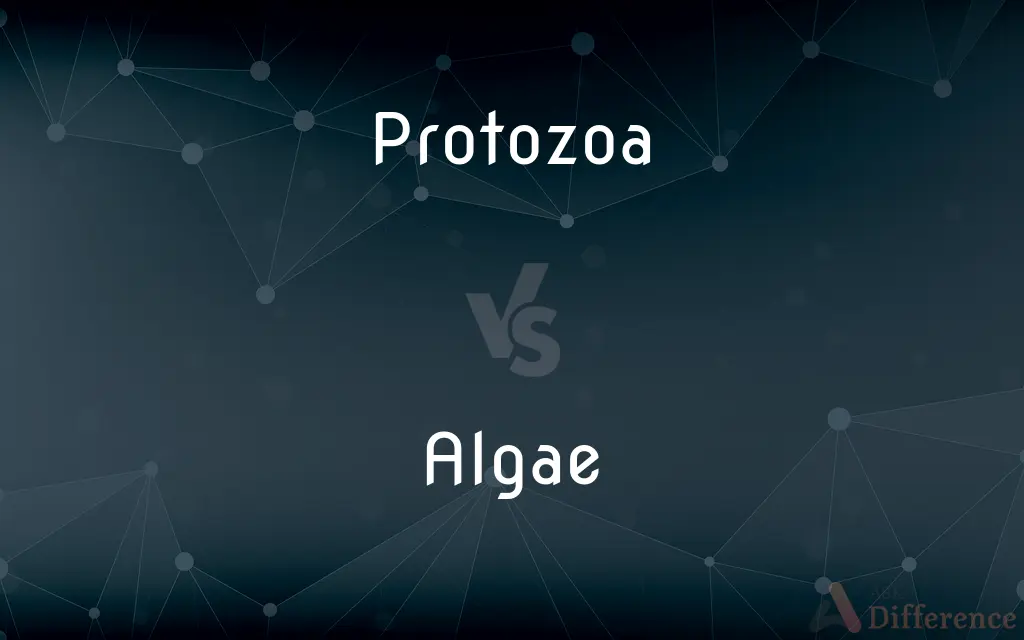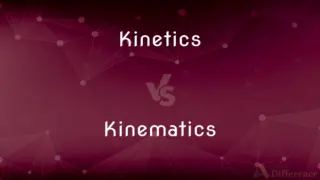Protozoa vs. Algae — What's the Difference?
By Tayyaba Rehman & Urooj Arif — Updated on April 16, 2024
Protozoa are single-celled, animal-like organisms that consume organic material, while algae are primarily photosynthetic organisms, ranging from single-celled to multicellular forms, often found in aquatic environments.

Difference Between Protozoa and Algae
Table of Contents
ADVERTISEMENT
Key Differences
Protozoa are typically heterotrophic and mobile, using cilia, flagella, or pseudopodia to move and feed on organic matter, whereas algae are mostly autotrophic, deriving energy from sunlight through photosynthesis.
The habitat of protozoa is diverse, including both aquatic and terrestrial environments where they play a role in decomposing and recycling nutrients, while algae are primarily aquatic, contributing significantly to oxygen production and carbon fixation in water bodies.
Protozoa reproduce mainly asexually through methods like binary fission, but some can engage in sexual reproduction, on the other hand, algae can reproduce asexually through spores or fragmentation and sexually by gametes depending on the species and conditions.
In terms of ecological roles, protozoa are important in the food web as both predators and prey, helping to control bacterial populations, whereas algae serve as a foundational component of aquatic ecosystems, providing food and oxygen to a wide range of marine and freshwater organisms.
Many protozoa are pathogenic to humans, causing diseases such as malaria and amoebiasis, on the other hand, most algae are beneficial, although blooms can lead to environmental issues like hypoxia and toxin production.
ADVERTISEMENT
Comparison Chart
Basic Nature
Single-celled, animal-like organisms.
Range from single-celled to multicellular, plant-like organisms.
Nutritional Type
Heterotrophic (consumes organic material).
Autotrophic (primarily uses photosynthesis).
Mobility
Mobile, using structures like cilia or flagella.
Mostly non-mobile; some single-celled forms have flagella.
Reproduction
Primarily asexual; some engage in sexual reproduction.
Both asexual and sexual modes of reproduction.
Role in Ecosystem
Decomposers, predators; some are pathogens.
Producers, foundation of aquatic food webs.
Compare with Definitions
Protozoa
Typically mobile, using various structures for movement.
Paramecium moves using cilia covering its surface.
Algae
Photosynthetic organisms found in aquatic environments.
Seaweed is a type of multicellular algae commonly found along coastlines.
Protozoa
Can be free-living or parasitic.
Giardia, a protozoan parasite, causes intestinal infections in humans.
Algae
Can be single-celled like phytoplankton or large like seaweeds.
Chlorella, a single-celled algae, is used as a dietary supplement.
Protozoa
Plays a role in nutrient cycling and controlling bacterial populations.
Protozoa in soil help decompose organic material.
Algae
Important in aquatic ecosystems and can cause blooms.
Algal blooms can deplete oxygen in water, causing fish kills.
Protozoa
Microscopic, single-celled organisms often found in water.
Amoebas, often found in pond water, are a type of protozoa.
Algae
Major oxygen producers through photosynthesis.
Phytoplankton produce a significant amount of Earth's oxygen.
Protozoa
Engages in heterotrophic feeding.
Protozoa consume bacteria and other small organisms for nutrients.
Algae
Can reproduce both sexually and asexually.
Algae can release spores that grow into new organisms.
Protozoa
Protozoa (also protozoan, plural protozoans) is an informal term for a group of single-celled eukaryotes, either free-living or parasitic, that feed on organic matter such as other microorganisms or organic tissues and debris. Historically, protozoans were regarded as "one-celled animals", because they often possess animal-like behaviours, such as motility and predation, and lack a cell wall, as found in plants and many algae.
Algae
Algae (; singular alga ) is an informal term for a large and diverse group of photosynthetic eukaryotic organisms. It is a polyphyletic grouping that includes species from multiple distinct clades.
Protozoa
Any of numerous chiefly single-celled eukaryotic organisms, most of which move about freely and ingest food, including the amoebas, ciliates, flagellates, and apicomplexans. Protozoans along with certain algae, oomycetes, and some other groups make up the protists.
Algae
Any of numerous photosynthetic organisms of aquatic or moist habitats, ranging in size from single-celled diatoms to large seaweeds such as kelp, and characterized by a lack of complex organs and tissues. Once classified within the plant kingdom, the algae are now considered to include several unrelated groups belonging to different kingdoms.
Protozoa
Plural of protozoan
Algae
Algal organisms viewed collectively or as a mass; algal growth.
Protozoa
Plural of protozoon
Algae
(countable) A particular kind of algae.
Protozoa
The lowest of the grand divisions of the animal kingdom.
Algae
Plural of alga.
Protozoa
In some classifications considered a superphylum or a subkingdom; comprises flagellates; ciliates; sporozoans; amoebas; foraminifers
Algae
Primitive chlorophyll-containing mainly aquatic eukaryotic organisms lacking true stems and roots and leaves
Common Curiosities
What are protozoa?
Protozoa are microscopic, single-celled organisms that are generally motile and heterotrophic.
Can protozoa be harmful to humans?
Yes, some protozoa are pathogenic and can cause diseases such as malaria and giardiasis.
Can algae be harmful?
While beneficial, some algae can form toxic blooms that are harmful to aquatic life and humans.
How do protozoa reproduce?
Protozoa mainly reproduce asexually through binary fission, although some have sexual reproduction cycles.
What is the ecological role of algae?
Algae act as primary producers in aquatic ecosystems, supporting the food web and contributing to oxygen production.
How do environmental conditions affect algae growth?
Conditions like light availability, temperature, and nutrient levels significantly influence algae growth and distribution.
Where are protozoa found?
Protozoa can inhabit a variety of environments, including freshwater, marine, and terrestrial ecosystems.
How are protozoa involved in disease?
Certain protozoa are parasites that can infect hosts, leading to diseases like toxoplasmosis.
What are algal blooms and why do they occur?
Algal blooms occur when nutrient levels in water bodies are high, leading to rapid algae growth, which can deplete oxygen and release toxins.
What are algae?
Algae are primarily photosynthetic organisms that can be either single-celled or multicellular, and are commonly found in aquatic environments.
Are protozoa visible to the naked eye?
Most protozoa are microscopic and require magnification to be seen clearly.
How do algae benefit the environment?
Algae help regulate atmospheric carbon dioxide levels and produce oxygen through photosynthesis.
What distinguishes protozoa from algae in terms of feeding?
Protozoa are heterotrophs that consume organic material, while most algae are autotrophs that perform photosynthesis.
What types of algae exist?
There are many types, ranging from microscopic phytoplankton to large seaweeds like kelp.
What are the main differences in the reproductive strategies of protozoa and algae?
Protozoa primarily reproduce asexually, while algae have diverse reproductive strategies, including both sexual and asexual reproduction.
Share Your Discovery

Previous Comparison
Cognition vs. Metacognition
Next Comparison
Kinetics vs. KinematicsAuthor Spotlight
Written by
Tayyaba RehmanTayyaba Rehman is a distinguished writer, currently serving as a primary contributor to askdifference.com. As a researcher in semantics and etymology, Tayyaba's passion for the complexity of languages and their distinctions has found a perfect home on the platform. Tayyaba delves into the intricacies of language, distinguishing between commonly confused words and phrases, thereby providing clarity for readers worldwide.
Co-written by
Urooj ArifUrooj is a skilled content writer at Ask Difference, known for her exceptional ability to simplify complex topics into engaging and informative content. With a passion for research and a flair for clear, concise writing, she consistently delivers articles that resonate with our diverse audience.
















































